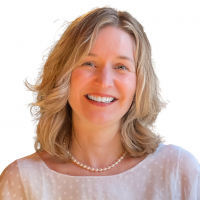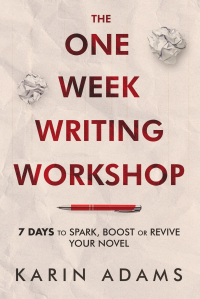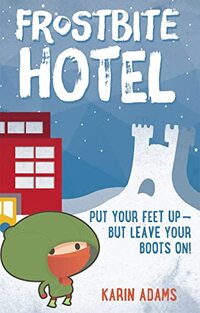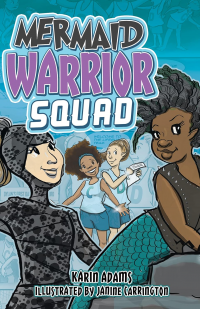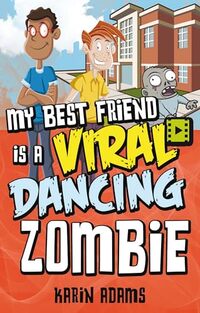Genre:
Teen & Young Adult Children's Advice & How To General Nonfiction- Country: Canada
- Books: 4
- Profession: Author
- Member Since: Sep 2024
- Profile Views: 3,417
- Followers: 63
Since 2010, Karin Adams has been delivering inspiring writing workshops and classes based on her own practices to help fiction writers of all stripes succeed in their projects. She has been a guest speaker at numerous conferences and professional development events.
Karin Adams is the creator and author of The One Week Writing Workshop, a practical guide helping aspiring novelists to grow their ideas and complete their projects.
Her books for younger audiences include Lights! Curtains! Cows!, No TV? No Fair!, My Best Friend is a Viral Dancing Zombie, and Mermaid Warrior Squad. Her middle grade novel Frostbite Hotel was shortlisted for the Hackmatack Children’s Choice Book Award and SYRCA’s Diamond Willow Award.
Karin Adams's Books
Stay in the loop on books by Karin Adams. See upcoming and best-selling books by the author here. You'll also find the deals on books by Karin Adams.
** Please note that the information or price displayed here may not be the updated. Make sure to double-check the latest book price before buying books.
** Also, there might be other books by Karin Adams not listed on AllAuthor.
| Book |
|---|
The One Week Writing Workshop: 7 Days to Spark, Boost or Revive Your Novelby Karin AdamsPublish: Oct 17, 2024Advice & How To General Nonfiction Business |
My Best Friend Is a Viral Dancing Zombieby Karin AdamsPublish: Aug 22, 2016Humor Teen & Young Adult Children's |
Karin Adams Interview On 07, Feb 2025
 "Karin Adams is an author, educator, and creator of “The One Week Writing Workshop," a practical guide for aspiring novelists. Since 2010, she has led inspiring writing workshops to help fiction writers bring their ideas to life. Her middle-grade novel “Frostbite Hotel” was shortlisted for the Hackmatack Children’s Choice Book Award and SYRCA’s Diamond Willow Award."
"Karin Adams is an author, educator, and creator of “The One Week Writing Workshop," a practical guide for aspiring novelists. Since 2010, she has led inspiring writing workshops to help fiction writers bring their ideas to life. Her middle-grade novel “Frostbite Hotel” was shortlisted for the Hackmatack Children’s Choice Book Award and SYRCA’s Diamond Willow Award."
I taught for several years as a university instructor, and I come from a long line of teachers in my family—so that’s definitely part of it! When I decided to turn my focus back to fiction, I was writing for young readers. I’d never forgotten those special author visits that had happened at my elementary school and how inspiring I’d found them as a child. So, I reached out to teachers that I knew in my community and soon found myself doing readings and workshop sessions to spark a love of story among their students. I quickly realized that sharing my writing process was not only a natural complement to my writing, but a passion. I began bringing my sessions to a wider variety of writing groups and venues. I saw firsthand how sharing what’s worked for me as a writer can inspire confidence and creativity in others, and that’s what still fuels me today.
Could you tell us more about the process you use in your One Week Writing Workshop to help aspiring novelists?The writing process that I share in my book is the one that I myself use to write my novels, and that I’ve been sharing in my writing workshops since 2010. All the strategies in it are things I actually do or have used to spark writing among other writers—no “filler” or busy work, but lots of fun and inspiration! My process has seven steps: Ideas, Character, Setting, Plot and Planning, Drafting, Rest and Revision. At each step, I share a Core activity. These are tasks that I do every time when I write a story, and that I always demonstrate in my workshops. The other activities in each step I call Warmups or Stretch activities. They support the Core activity by either getting you ready (warming you up) or expanding what you’ve done in the Core (stretching yourself). I also share some non-desk, outside-the-box tactics that I turn to to shake ideas loose and reinvigorate my creativity—I think it’s these unexpected strategies that make The One Week Writing Workshop quite unique.
As an author of multiple books, how do you balance writing with your teaching and speaking engagements?It’s not always balanced! Sometimes my schedule is filled with events and my writing slows a bit, and the opposite can be true as well. Certain seasons of the year tend to be more workshop-oriented than others when schools are in session or writing groups are meeting. I’ve learned to strive for an overall balance between teaching and writing in my life even if every day isn’t a perfect split between the two things I love. However, the best tactic I have for keeping writing a part of my everyday life even when I’m busy “workshopping” is a strategy I share in The One Week Writing Workshop called The 500/500 Method. It’s a regular but very doable writing routine with a bit of helpful review and polish thrown in.
What do you find most rewarding about working with young fiction writers and helping them complete their projects?I’ve worked in lots of different situations with young people, each with their own unique group dynamics, and there’s something wonderful every time. If I’m leading sessions where young writers have signed up to be there—say, during holiday programming at a library—chances are this is a group of young people who see themselves as writers. We can build on that energy together and work at pushing creative boundaries. The reward here is sharing new tactics or perspectives that these keen writers can add to their toolkits.
On the other hand, in a school classroom you usually have a range of personalities and interests. Not everyone enjoys reading and/or identify as writers. Many students don’t believe they can write. My challenge there—and my reward—is showing them that everyone can create, everyone has something to say. Everyone can express themselves as writers—that’s the guiding principle behind all my workshop activities. When the most reluctant of participants shows pride in what they’ve created, that’s absolutely the best reward.
How has your experience as a guest speaker at conferences and events influenced your writing or teaching methods?Whenever you engage with people, especially about a topic that you are all drawn to, there’s an opportunity for everyone to learn and grow, even the speaker. By listening to questions, it gets me thinking in new ways and seeing things about the writing process I may not have before. I sometimes learn where the gaps may be in my own presentation or where I can go further. I’ll leave knowing what I can strengthen and clarify for the next time. Also, over the years I’ve worked with many professional educators. I’ve learned so much from them about teaching in talking to them, and especially in watching them in action! There’s such an art to teaching where you’re working with a group, but at the same time finding ways to support individuals and their unique needs and challenges.
What key advice would you give to a new writer just starting their first novel?First of all, I’d tell you I was excited for you! The beginning of the writing process is such a special, energetic time. I’d encourage you to keep an open mind, to not be afraid to play and experiment with your ideas even if you decide to make a story plan or outline before you draft. Really let you imagination and instincts help shape where this is all going! If you decide to consult a writing guide, I’d of course I’d tell you about The One Week Writing Workshop! But I’d also advise that whatever reference guide you use or workshop you might take, be sure to balance it with time set aside for actual writing!
You’ve written for younger audiences, including books like “Lights! Curtains! Cows! and Mermaid Warrior Squad.” What do you think appeals most to young readers?I love this question! I’ve been so lucky that my writing workshops let me chat face to face with my readers. They certainly love the humour in my books, but more than anything I think they appreciate the characters. I strive to create authentic young characters who see the world as a young person would—who feel things and have experiences that my audience can relate to. When readers tell me that they identify with a particular character or have experienced similar emotions in their own lives, that’s when I feel most proud of my work.
Can you share the journey of writing “Frostbite Hotel” and the impact of its recognition, such as being shortlisted for the Hackmatack Children’s Choice Book Award?This story hung around in my brain for years. It’s about an entrepreneurial boy who decides to run his snow fort as a place to relax at recess—a snow hotel—and he and his friends are going to make a fortune in the process (or not!). It was inspired by the way I remember recess from my school days. It wasn’t just playtime—it was a whole world with its own rules and politics, even a snack-based “economy”. This was especially true when it came to building snow forts during the winter. At my school, this went well beyond making structures in the snow—it was serious business!
I had so much fun writing this story, and so when it was shortlisted for two book awards I was thrilled. The best part was that both honours were based on children’s choice, meaning that young readers were the ones who voted for the book. The Hackmatack nomination involved a regional book tour and awards ceremony in Canada’s maritime region. I got to travel there and to meet and connect with a whole other group of readers in person—a fantastic experience! Of course, being shortlisted put Frostbite Hotel on more “radars” so to speak. It helped to expand my audience, which in turn encourages me to keep writing for them!
In your workshops, do you find that aspiring writers often struggle with the same challenges? If so, how do you help them overcome them?I’ve seen a lot of different writing challenges, but the one that stands out above them all is perfectionism. It can manifest itself in all sorts of ways. For instance, I’ve seen very young writers unable to proceed with their draft when they run into spelling difficulties or even get discouraged if their draft lacks neatness. On the other end of the spectrum is the frustration that arises when a draft is simply not reflecting the wonderful story idea that’s living inside the writer, that feeling of “I know what I want to say, but I can’t say it!”. My best antidote to perfectionism in any form is process—as in let’s focus on the process instead of the perfect product. Let’s start taking steps one at a time. A first draft will not be perfect, and even a revised draft may need some further work. While this may sound discouraging because it implies there’s more to be done, it’s also liberating. We don’t need to get it right the first time, in fact, we shouldn’t expect to! Process over perfectionism—that kind of mantra helps us to see our “imperfect” attempts not as failures but as important steps on a greater path.
Your books have a fun and creative spirit. How do you balance humor and adventure in your writing for young readers?Thank you, I appreciate that! I’ve always loved books that make me laugh, and my younger self felt that playing and creating and just being with my friends brought about adventures. I think this is why I’ve been drawn to write real world stories. Sometimes real life can have over-the-top moments of outlandish fun—most of my books have one or two scenes like that—but I also try to balance that with more vulnerable moments, especially between the friends in my books. My own friends and I challenged each other, sometimes argued with each other, and we supported each other as we were figuring out life—so that’s what my characters do, too.
How did your own journey as a writer evolve, and what were some key moments that shaped your career?I’ve always loved stories, from those first tales my mom read to me before bedtime. I knew the moment she began reading to me my very first chapter book, The Lion, the Witch and the Wardrobe, that one day I wanted to write a story like that—a story that could make you see and experience a whole world in your head, even without pictures. Growing up, I also had amazing teachers who actively encouraged my creative writing—I’ve even visited many of their classrooms recently as a guest speaker! This early support helped make creative writing an ongoing part of my life.
Having my first book published was certainly another key moment, and being able to connect with my young readers in my writing workshops inspires my work and fuels my desire to keep writing.
What are the most important qualities for writers to develop when working on middle grade or young adult fiction?Characters are important no matter the genre that you’re working in or the audience you’re writing for. But I think it’s especially important to be mindful of your approach to character when writing for a younger audience. An adult writer has the experience of having been young, but we have to get back there, and dwell there again somehow when we write for this audience. I think that the best way to do this is to keep in touch with what I call your “emotional memory”—actively remembering what it felt like to be a young person in particular situations, big and small. You can get there by daydreaming, journaling, asking yourself “what would my younger self do or feel if this happened to her”? Another strategy is to pay close attention and keep an open heart for the young people in your life—which is good advice whether you’re writing for them or not!
What is your process for brainstorming and developing ideas for new stories?This is exactly the sort of thing I love to get into! I share it in detail in The One Week Writing Workshop. I have all sorts of tactics for brainstorming and growing ideas—not just at the beginning, but at every stage of the writing process. Broadly speaking, I like to make webs, sketch things out, chart plots with sticky notes, and draw maps of my settings to flesh out ideas I’ve sparked. When I’m stuck for ideas, I like to actively prime myself for creative inspiration by listening to music, looking at artwork, even going for a walk to let my mind wander. Ideas can come from anywhere and at any time if we stay open to them.
What are you working on next, and what can readers look forward to from you in the future?In terms of fiction, I’m currently working on a novel-length reimagined fairytale. It’s a somewhat different style of writing for me, but I’m enjoying the challenge! In non-fiction, I’ve been posting articles about fiction writing on my author website, https://www.karinadams.com. I’m also developing a sort of companion guide to The One Week Writing Workshop for teachers and writing workshop leaders who want to use my strategies with their own groups.
When did you join AllAuthor? What has your experience been like?I’m a recent member here at AllAuthor joining with the release of my new book The One Week Writing Workshop. It’s been a great platform for spreading the word about my books to readers. There’s lots of helpful advice and resources to support authors. I’m grateful to be here and looking forward to discovering more!
Ask Karin Adams a Question
Have brimming questions to ask author Karin Adams? Ask whatever you like, but keep it appropriate.
** Please note that unanswered questions will not appear on the page. Refrain from posting promotional messages.
